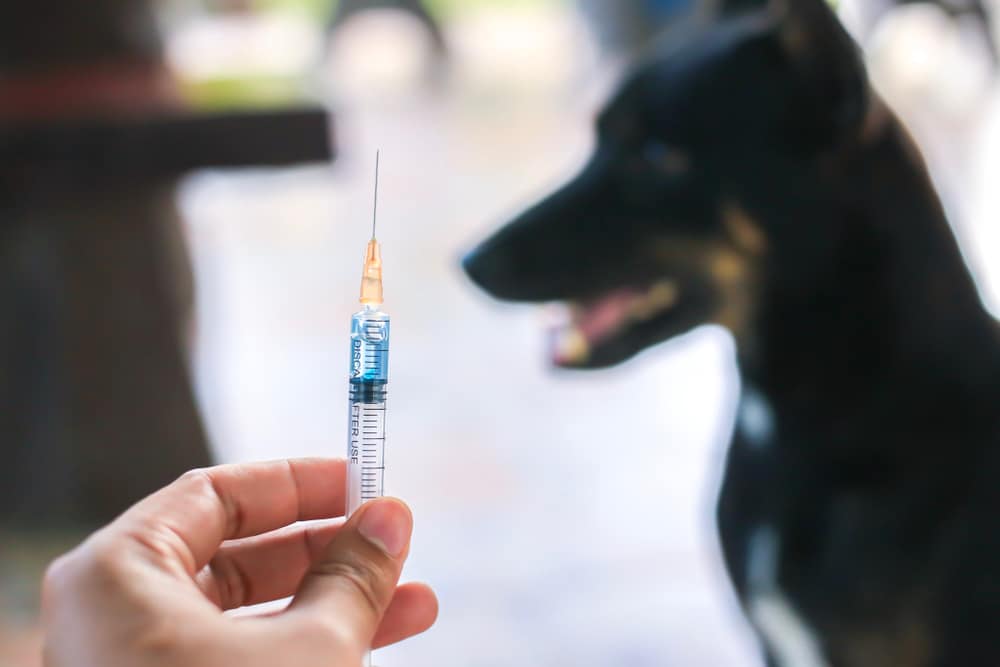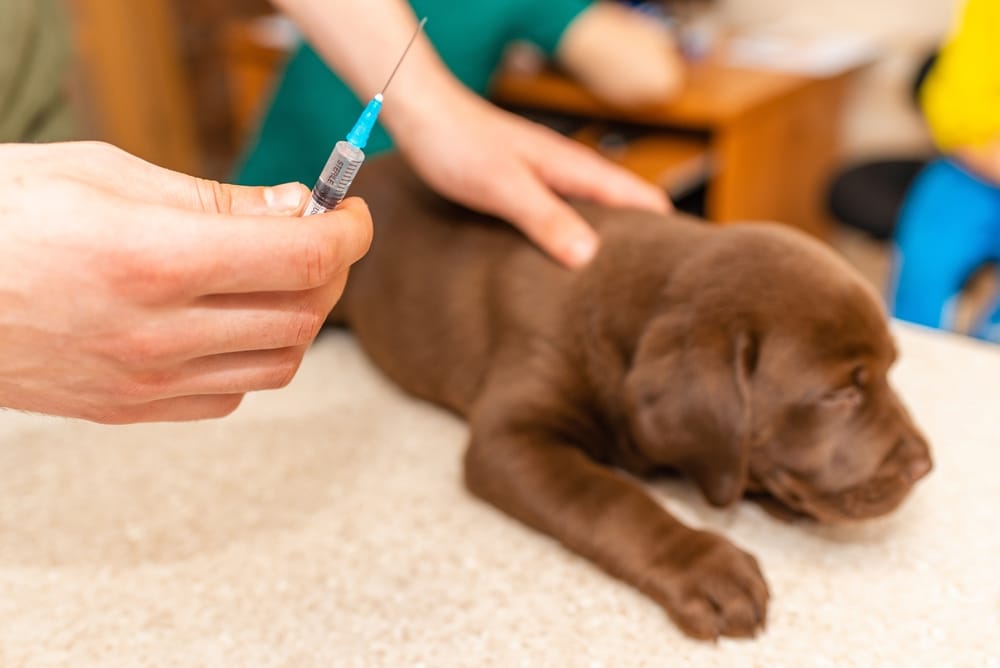One of the ways to keep your dog safe from certain diseases is through regular and scheduled vaccinations. Depending on where you live, there are different rules regarding vaccines that are regulated by law. Vets usually are good at reminding the owners to check about their next vaccination, but it’s also a good idea for owners to give themselves a reminder too. So, keeping that in mind, when should dogs get vaccines anyway?
Vaccine protocol starts as early as six weeks for puppies. However, some vets may recommend the first vaccine be done at around eight weeks of age. This depends on veterinary experience, the region where they live, and the vaccine that is used.
Table of Contents
What Are Vaccines And Why Are They Important For Your Dog?

Vaccines are products that trigger the immune system to create defensive cells against certain illnesses and diseases, which your dog may encounter during its life. In a way, they prepare the body to recognize an intruder faster and create an army in order to stop it from causing more problems.
Usually, puppies are protected early in their life through the colostrum that they get from their mom. But that protection wears off, which means they need something from the outside to help the immunity to develop proper protection. Another reason why dogs need to be vaccinated is that this way, we are also protected from certain diseases that can be transmitted from dogs to people, such as leptospirosis.
Also, if dogs are not vaccinated, and they catch a deadly disease, they may die. This is especially important in very young puppies whose immune system is still not fully developed. Also, as an owner, you may want to travel with your dog, and there are certain rules about vaccines that your dog needs to have prior to travel. The same may apply if you want to send your dog to a boarding kennel or doggy daycare.
What Vaccines Do Dogs Need?
Nowadays, there are different manufacturers of vaccines for dogs, but the schedule and protocol for vaccinations is pretty much the same. Here is a list of the most common diseases against which dogs get vaccinated regularly.
Parvovirus
This is one of the most common reasons for a puppy’s death. The virus attacks the gastrointestinal system, causing bloody diarrhea, vomiting, and loss of appetite. Puppies lose a lot of fluids very easily, and this is usually the cause of death.
Canine Distemper
This is another highly contagious disease that attacks the respiratory, gastrointestinal, and nervous systems. Puppies that survive this virus usually have consequences later on in their life. There is no cure for this virus, and puppies only get supportive medications.
Canine Hepatitis
This highly contagious virus affects the liver, kidneys, and spleen. Puppies show signs of jaundice, vomiting, diarrhea, and loss of appetite.
Canine Parainfluenza And Bordatella Bronchiseptica
The first one is a virus, and the second one is a bacteria, but together with a few other viruses, they cause something that is known as kennel cough. Dogs and puppies show respiratory symptoms that can sometimes last for a couple of weeks.
Rabies
This virus invades the central nervous system, which causes drooling, anxiety, fear of water, and in the end, death. This disease also affects humans and is transmitted only through a bite. Unfortunately, if the patient is not treated in the next few hours, patients usually die. This is also a vaccine that is needed whenever your dog travels to other countries.
Leptospirosis
Another bacteria that causes serious consequences in dogs and can be transmitted to humans too. It is easily prevented with regular vaccination.
When Should My Dog Be Vaccinated?
The protection of your dog starts from an early age. Usually, every protocol starts at around six to eight weeks of age, but before a vaccine is applied, the puppy needs to be dewormed. Another important thing that vets always take into consideration is that they do a thorough examination of the puppy because they never give a vaccine to a puppy that is showing signs of an illness or a disease, even if it does not seem like it’s serious.
After the first round of vaccines, there are boosters that come after at least three weeks, which is known as a booster vaccine. Then there is a second booster, also given after three weeks.
Some vaccines are given once per year after the initial vaccine, while others are given every few years. The schedule for this is prepared by your vet, depending on your dog’s needs and your travel plans, as well as the regulations from the government.
Conclusion: When Do Dogs Get Vaccines?
Vaccinations are an important part of your fluff ball’s life, and we do know they are not always pleasant. They don’t hurt, but who wants needles being poked in them, right? As owners, we always want what is best for our dogs, which is why following the schedule and staying on top of vaccinations keeps our pets safe from certain illnesses and diseases.
So, is your dog ready for some vaccinations soon? Are you getting a dog soon? Let us know in the comments below!
